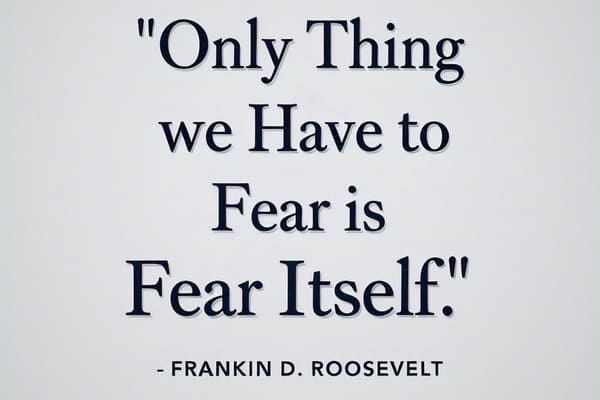Fear is a powerful emotion that can either protect or paralyze us. The famous quote by Franklin D. Roosevelt, “The only thing we have to fear is fear itself,” reminds us that it’s not always the situation itself that holds us back, but our perception of it. Understanding how fear operates and learning about ways of overcoming fear can unlock new levels of confidence, success, and fulfillment.

Fear Magnifies Problems That Don’t Exist
Fear has a unique ability to exaggerate risks and create scenarios that may never happen. Psychologists call this ‘catastrophizing‘ — imagining the worst possible outcomes even when evidence suggests otherwise. For instance, a study published in The Journal of Anxiety Disorders found that over 85% of what people worry about never actually occurs. By acknowledging this tendency, you can shift focus from imagined dangers to real opportunities.
Fear Limits Your Potential
When fear takes over, it often restricts you from taking necessary risks. Whether it’s pursuing a new career path, starting a business, or even forming new relationships, fear convinces you to stay in your comfort zone. Research from Harvard Business Review highlights that employees who embrace calculated risks are 50% more likely to be promoted than those who consistently avoid uncertainty. Overcoming fear allows you to explore new possibilities and build resilience.
Fear Weakens Decision-Making
Fear can cloud judgment and lead to poor decisions. When driven by anxiety, the brain’s amygdala — responsible for processing threats — takes control, reducing logical thinking. This reaction is why impulsive decisions are common under stress. Developing mindfulness practices or deep-breathing exercises can help calm this response, allowing you to make clearer choices even in challenging situations.
Fear Feeds on Uncertainty
Uncertainty often fuels fear, as the brain naturally seeks control and predictability. According to a Psychological Science study, people experience more stress when anticipating an uncertain outcome than they do when facing a confirmed negative result. Learning to tolerate uncertainty by focusing on what you can control helps reduce anxiety and improves overall mental well-being.

Fear Stifles Creativity and Innovation
Creativity thrives in an environment of openness and experimentation, but fear suppresses that. When individuals fear criticism, failure, or rejection, they often hesitate to share their ideas. A 2022 study by Stanford University found that employees in psychologically safe environments — where fear is minimized — were 70% more likely to present innovative ideas. Embracing a mindset where mistakes are viewed as learning opportunities can unleash your creative potential.
Fear Strengthens with Avoidance
Avoiding what scares you reinforces its power. This avoidance behavior signals to your brain that the fear is valid, making it harder to overcome in the future. Exposure therapy — gradually facing your fears — has been shown to reduce anxiety significantly. By confronting discomfort in manageable steps, you train your mind to recognize that the perceived threat isn’t as severe as you once believed.
Fear Can Be Harnessed as Motivation
While fear can be limiting, it can also serve as a powerful motivator when channeled correctly. Athletes, public speakers, and performers often use nervous energy to enhance focus and drive. Instead of resisting fear, reframing it as excitement or anticipation can transform negative energy into performance-enhancing momentum.
Fear is Often Rooted in Past Experiences
Many fears are linked to past experiences that shaped your perception of risk. Childhood setbacks, past failures, or social conditioning can create lingering anxieties. Recognizing these patterns allows you to separate past fears from present reality. Techniques like cognitive behavioral therapy (CBT) have proven effective in rewiring these limiting beliefs, helping individuals regain control over their thoughts.
Embracing Courage in the Face of Fear
True courage is not the absence of fear but the ability to act despite it. By acknowledging fear and choosing to move forward, you build confidence and develop mental toughness. Every time you face a challenge head-on, you train yourself to handle bigger obstacles in the future.
Fear will always exist, but it doesn’t have to control your choices. By confronting it directly, you unlock the potential to grow, innovate, and thrive in every area of life.





